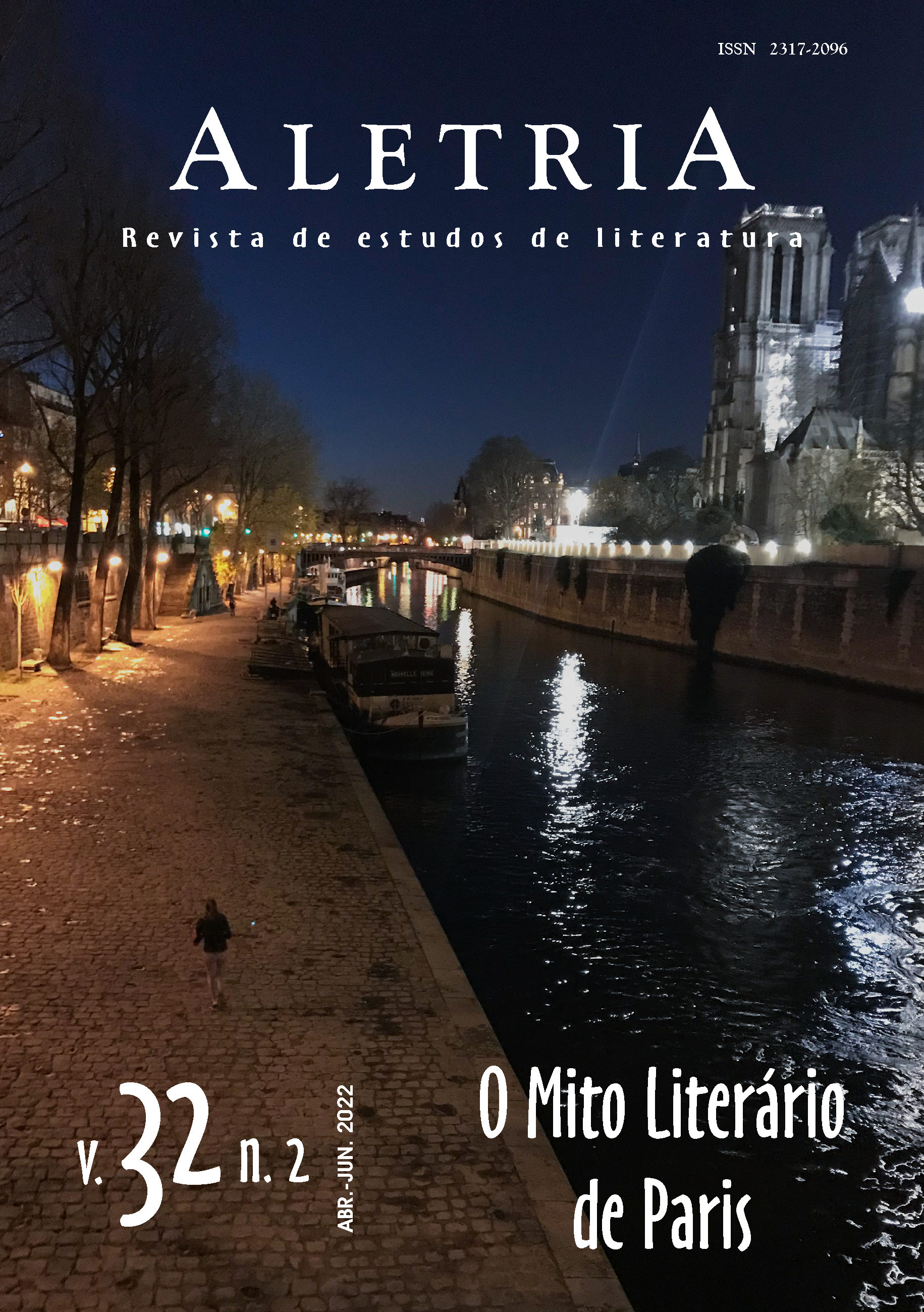The Neo-Slave Novel and Progressive Eugenics in Colson Whitehead’s The Underground Railroad
DOI:
https://doi.org/10.35699/2317-2096.2022.29105Palavras-chave:
neo-slave novel, progressivism, eugenics, racism, historyResumo
Colson Whitehead has been noted for writing books that migrate from one literary genre to another exhibiting then a penchant for genre eclecticism. In light of that, this study proposes that his book The Underground Railroad (2016) should be classified as a neo-slave novel due to its autonomy in recreating antebellum slavery. Besides, in so doing, Whitehead revisits specific shameful historical events represented by his country’s long use of racist medical procedures such as progressive eugenics. These events have been largely forgotten by most Americans and, thus, by recuperating such shameful past Whitehead indicates that progressive eugenics not only reproduced the same racist ideology under slavery but the writer also suggests the possibility that similar medical practices might still be in use today albeit with different names. In pursuing this analysis, the article turns to authors such as Bernard Bell (1987), Toni Morrison (1995), Ashraf H. A. Rushdy (1999), Valerie Smith (2007) as well as interviews with Whitehead.
Downloads
Referências
ALLEN, Garland E. Is a New Eugenics Afoot? Science, v. 294, p. 59-62, 2001.
BALDWIN, J. The Creative Process. Library of Congress, 1998, p. 669-672.
BELL, B. The Afro-American Novel and Its Tradition. Amherst: University of Massachusetts Press, 1987.
BOUCHE, T. America’s Hidden History: the Eugenics Movement. Scitable by Nature Education: A Collaborative Learning Space for Science, 18 set. 2014. Disponível em: https://www.nature.com/scitable/forums/genetics-generation/america-s-hidden-history-the-eugenics-movement-123919444/. Acesso em: 16 jan. 2021.
BROWNLEE, D. Dear Progressives: Racism is Airborne and no One is Immune…not Even you. Forbes, 1 oct. 2020. Disponível em: https://www.forbes.com/sites/danabrownlee/2020/10/01/dear-progressives-racism-is-airborne-and-no-one-is-immunenot-even-you/?sh=1268007a24f4. Acesso em: 17 jan. 2021.
BUTLER, O. Kindred. Boston: Beacon, 1979.
COATES, T. The Water Dancer. New York: One World, 2019.
DISCHINGER, M. States of Possibility in Colson Whitehead’s The Underground Railroad. The Global South, v. 11, n. 1, p. 82-99, 2017.
FINOH, M. Allegations of forced sterilization in ICE detention evoke a long legacy of eugenics in the United States. Center for Constitutional Rights, 18 set. 2020. Disponível em: https://ccrjustice.org/home/blog/2020/09/18/allegations-forced-sterilization-ice-detention-evoke-long-legacy-eugenics.
GAINES, E. J. The Autobiography of Miss Jane Pittman. New York: Bantam Dell, 1971.
GILL, H. Conson Whitehead on “The Underground Railroad”. Scroll.in, 10 feb. 2019. Disponível em: https://scroll.in/article/912623/colson-whitehead-on-the-underground-railroad-theres-no-rule-about-what-i-can-write. Accessed 05 Jul 2020. Acesso em: 16 jan. 2021.
HOVENKAMP, H.J. The Progressives: Racism and Public Law. Arizona Law Review, v. 59, p. 947-1003, 2017.
LI, S. Genre Trouble and History’s Miseries in Colson Whitehead’s The Underground Railroad. Melus, v. 44, n. 2, p. 1-23, 2019.
MCCABE, L.; MCCABE, E. Are we Entering a “Perfect Storm” for a Resurgence of Eugenics? Science, Medicine, and their Social Context. In: LOMBARDO, P. (ed.). A Century of Eugenics in America: From the Indiana Experiment to the Human Genome era. Bloomington: Indiana University Press, 2011, p. 193-218.
MOORE, S. ICE is accused of sterilizing detainees. That echoes the U.S.’s long history of forced sterilization. The Washington Post, 25 set. 2020. Disponível em: https://www.washingtonpost.com/politics/2020/09/25/ice-is-accused-sterilizing-detainees-that-echoes-uss-long-history-forced-sterilization/.
MORRISON, T. The Site of Memory. In: WILLIAM, Z (ed). Inventing the Truth: The Art and Craft of Memoir. New York: Houghton Mufflin, 1995, p. 83-102.
MORRISON, T. Beloved. New York: Penguin Books, 1987.
NUGENT, W. Progressivism: A Very Short Introduction. Oxford: OUP, 2010.
REED, I. Flight to Canada. New York: Open Road Integrated Media, 1976.
REVERBY, S. M. Examining Tuskegee: The Infamous Syphilis Study and Its Legacy. North Carolina: The University of North Carolina Press, 2009.
RUSHDY, A. H. A. Neo-Slave Narratives: Studies in the Social Logic of a Literary Form. Oxford: OUP, 1999.
SHUKLA, N. Colson Whitehead: each book an antidote. Guernica, 24 apr. 2013. Disponível em: www.guernicamag.com/colson-whitehead-each-bookan-antidote/. Acesso em: 16 jan. 2021.
SMITH, V. Neo-Slave Narratives. In: FISCH, A. A. The Cambridge Companion to The
African American Slave Narrative. Cambridge: Cambridge University Press, 2007, p. 168-185.
WALKER, M. Jubilee. New York: Second Mariner Books, 1966.
WHITEHEAD, C. The Intuitionist. New York: Anchor Books, 1999.
WHITEHEAD, C. Sag Harbor. New York: Anchor Books, 2010.
WHITEHEAD, C. Zone One. New York: Anchor Books, 2011.
WHITEHEAD, C. The Underground Railroad. New York: Doubleday, 2016.
WHITEHEAD, C. The Nickel Boys. New York: Fleet, 2019.
Downloads
Publicado
Edição
Seção
Licença
Copyright (c) 2022 Roberto Ferreira Junior (Autor)

Este trabalho está licenciado sob uma licença Creative Commons Attribution 4.0 International License.
Autores que publicam nesta revista concordam com os seguintes termos:Autores mantém os direitos autorais e concedem à revista o direito de primeira publicação, com o trabalho simultaneamente licenciado sob a Licença Creative Commons Attribution que permite o compartilhamento do trabalho com reconhecimento da autoria e publicação inicial nesta revista.Autores têm autorização para assumir contratos adicionais separadamente, para distribuição não-exclusiva da versão do trabalho publicada nesta revista (ex.: publicar em repositório institucional ou como capítulo de livro), com reconhecimento de autoria e publicação inicial nesta revista.Autores têm permissão e são estimulados a publicar e distribuir seu trabalho online (ex.: em repositórios institucionais ou na sua página pessoal) a qualquer ponto antes ou durante o processo editorial, já que isso pode gerar alterações produtivas, bem como aumentar o impacto e a citação do trabalho publicado (Veja The Effect of Open Access).














